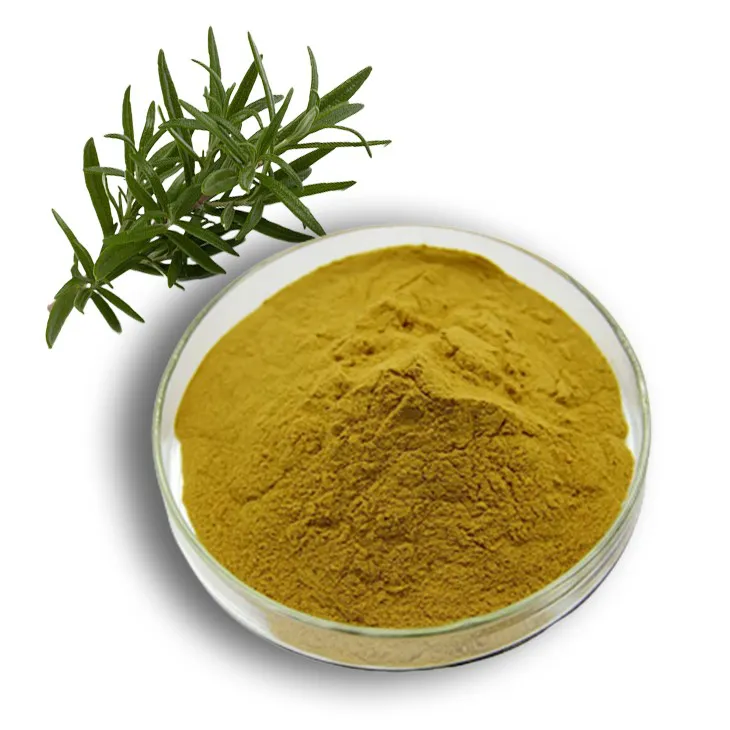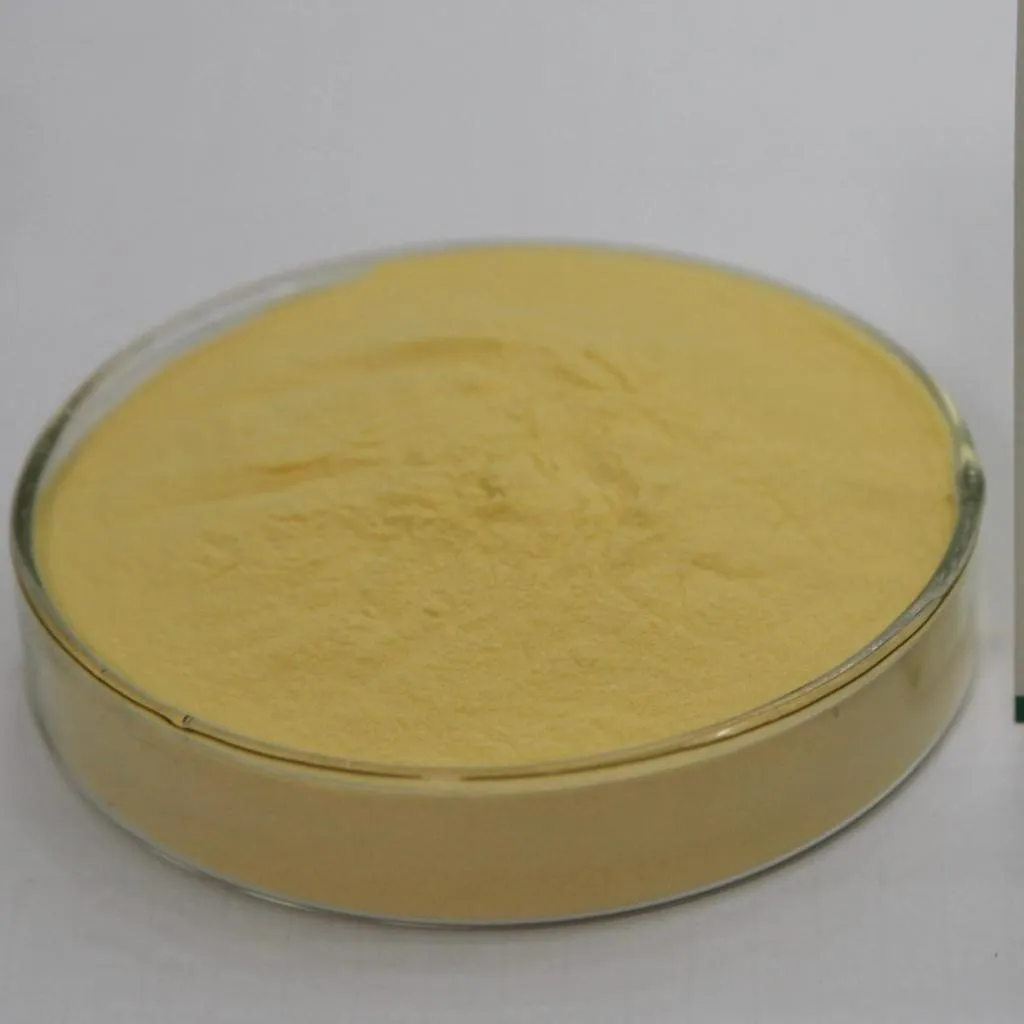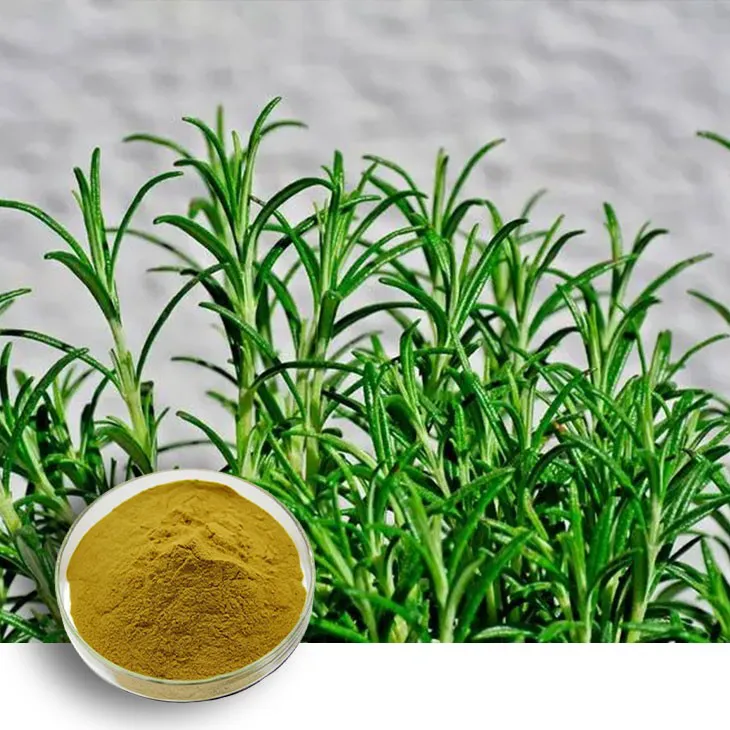- 0086-571-85302990
- sales@greenskybio.com
Rosemary extract: What are its benefits and how to take it?
2024-11-11

1. Introduction
Rosemary, a fragrant herb that has been used for centuries in cooking, medicine, and cosmetics, contains an extract with a wide range of potential benefits. Rosemary extract is derived from the leaves of the rosemary plant (Rosmarinus officinalis). This extract has become increasingly popular in recent years due to its various health - promoting and skin - enhancing properties.

2. Benefits of Rosemary extract
2.1 Digestive Aid
Rosemary extract can play a beneficial role in digestion. It stimulates the production of digestive juices such as bile and gastric juices. Bile is essential for the breakdown and absorption of fats in the small intestine. By promoting the secretion of bile, rosemary extract helps the body to more effectively process and utilize dietary fats. Additionally, the increased production of gastric juices can enhance the digestion of proteins and other nutrients in the stomach.
Moreover, rosemary extract has been shown to have a calming effect on the digestive tract. It can help soothe irritation and inflammation in the stomach and intestines. This is particularly useful for individuals who suffer from conditions such as indigestion, acid reflux, or irritable bowel syndrome (IBS). For those with IBS, the anti - inflammatory properties of rosemary extract may help to reduce abdominal pain, bloating, and diarrhea.
2.2 Antibacterial Effects
One of the significant benefits of rosemary extract is its antibacterial properties. It contains compounds such as rosmarinic acid and carnosic acid that have been shown to be effective against a wide range of bacteria. These antibacterial agents can help to protect the body from harmful bacterial infections.
In the digestive system, for example, the antibacterial action of rosemary extract can help to maintain a healthy balance of gut bacteria. It can inhibit the growth of pathogenic bacteria such as Escherichia coli (E. coli) and Salmonella, which are often responsible for foodborne illnesses. By reducing the number of harmful bacteria in the gut, rosemary extract can contribute to better overall digestive health.
Rosemary extract can also be beneficial for skin health due to its antibacterial effects. It can be used topically to treat skin infections such as acne. Acne is often caused by the overgrowth of Propionibacterium acnes (P. acnes), a bacteria that lives on the skin. The antibacterial compounds in rosemary extract can target and kill P. acnes, helping to reduce the occurrence and severity of acne breakouts.
2.3 Antioxidant Properties
Rosemary extract is a rich source of antioxidants. Antioxidants are substances that can neutralize free radicals in the body. Free radicals are unstable molecules that are produced as a by - product of normal cellular metabolism. If left unchecked, free radicals can cause oxidative stress, which is associated with a variety of health problems, including aging, cancer, and heart disease.
The antioxidants in rosemary extract, such as rosmarinic acid and carnosic acid, can donate electrons to free radicals, thereby stabilizing them and preventing them from causing damage to cells and tissues. By reducing oxidative stress, rosemary extract may help to slow down the aging process, improve skin health, and protect against chronic diseases.
For example, in the skin, antioxidants can help to prevent the breakdown of collagen, a protein that provides structure and elasticity to the skin. By protecting collagen, rosemary extract can help to keep the skin firm and youthful - looking. Additionally, the antioxidant properties of rosemary extract may also help to protect the skin from damage caused by environmental factors such as ultraviolet (UV) radiation and pollution.
2.4 Cognitive Function Support
There is evidence to suggest that rosemary extract may have a positive impact on cognitive function. Some studies have shown that the compounds in rosemary extract can improve memory, attention, and concentration.
One of the ways in which rosemary extract may affect cognitive function is by increasing blood flow to the brain. By improving cerebral circulation, more oxygen and nutrients can reach the brain cells, which is essential for optimal brain function. Additionally, the antioxidants in rosemary extract may also help to protect brain cells from oxidative damage, which can contribute to cognitive decline over time.
Rosemary extract may also have a neuroprotective effect. It can help to prevent the death of brain cells in conditions such as Alzheimer's disease and Parkinson's disease. While more research is needed in this area, the potential of rosemary extract for maintaining and improving cognitive function is promising.
2.5 Anti - Inflammatory Properties
As mentioned earlier, rosemary extract has anti - inflammatory properties. Inflammation is a natural response of the body to injury or infection, but chronic inflammation can lead to a variety of health problems, including arthritis, heart disease, and cancer.
The anti - inflammatory compounds in rosemary extract, such as rosmarinic acid and carnosic acid, can inhibit the production of inflammatory mediators such as cytokines and prostaglandins. By reducing inflammation, rosemary extract can help to relieve pain, swelling, and redness associated with inflammatory conditions.
In the case of arthritis, for example, applying rosemary extract topically or taking it orally may help to reduce joint pain and inflammation. Similarly, in individuals with heart disease, the anti - inflammatory properties of rosemary extract may help to reduce the risk of further damage to the heart and blood vessels.

3. How to Take Rosemary Extract
3.1 Tincture
A tincture is a concentrated liquid extract of rosemary. To take rosemary extract as a tincture, it is typically diluted in water or another liquid. The recommended dosage may vary depending on the concentration of the tincture and the individual's needs. However, a general guideline is to start with a small dose, such as 1 - 2 milliliters, and gradually increase the dose if needed.
When taking a rosemary tincture, it is important to follow the instructions provided by the manufacturer or a healthcare professional. Tinctures are usually taken orally, either directly under the tongue or mixed with a small amount of water and swallowed.
3.2 Capsules
Rosemary extract is also available in capsule form. Capsules are a convenient way to take the extract, especially for those who do not like the taste of tinctures or who prefer a more precise dosage. The dosage of rosemary extract in capsules can vary, but a common dosage is around 500 - 1000 milligrams per capsule.
When taking rosemary extract capsules, it is advisable to take them with a glass of water. It is also important to follow the recommended dosage instructions on the product label. If you have any underlying health conditions or are taking medications, it is best to consult a healthcare professional before starting to take rosemary extract capsules.
3.3 Topical Application
Rosemary extract can be used topically for skin benefits. It is often included in skincare products such as creams, lotions, and serums. When using rosemary - extract - spiked skincare products, it is important to follow the product instructions.
If you want to make your own rosemary extract - based topical treatment, you can create a simple infusion. Boil a small amount of water and add a handful of fresh rosemary leaves. Let the leaves steep in the hot water for about 10 - 15 minutes. Strain the liquid and allow it to cool. You can then use a cotton ball to apply the infusion to the skin. However, it is important to note that some people may be sensitive to rosemary extract, so it is advisable to do a patch test on a small area of skin first.

4. Precautions
While rosemary extract has many potential benefits, there are also some precautions to keep in mind.
- Pregnancy and breastfeeding: There is limited research on the safety of rosemary extract during pregnancy and breastfeeding. It is best to avoid using rosemary extract during these periods unless advised by a healthcare professional.
- Allergic reactions: Some people may be allergic to rosemary extract. If you experience any signs of an allergic reaction, such as itching, rash, or difficulty breathing, after using rosemary extract, discontinue use immediately and seek medical attention.
- Medication interactions: Rosemary extract may interact with certain medications. For example, it may increase the risk of bleeding when taken with blood - thinning medications such as warfarin. If you are taking any medications, it is important to consult a healthcare professional before starting to take rosemary extract.

5. Conclusion
Rosemary extract offers a wide range of potential benefits, from aiding digestion and having antibacterial effects to supporting cognitive function and providing antioxidant protection. It can be taken in various forms, including tinctures, capsules, and used topically in skincare products. However, it is important to be aware of the precautions associated with its use, especially during pregnancy, breastfeeding, and when taking medications. By understanding the benefits and proper usage of rosemary extract, individuals can make informed decisions about incorporating it into their health and skincare regimens.
FAQ:
What are the main benefits of rosemary extract?
Rosemary extract has several benefits. It can aid in digestion, which means it may help the body break down food more efficiently. It also may have antibacterial effects, which could potentially help in fighting off harmful bacteria in the body.
Can rosemary extract be used for skin health?
Yes, it can. Rosemary extract - spiked skincare products are available for topical use. When applied to the skin, it may offer various benefits, such as antioxidant protection, which can help prevent damage from free radicals and potentially keep the skin looking healthier.
How should one take rosemary extract as a tincture?
The exact way to take rosemary extract as a tincture can vary. Generally, it should be taken following the instructions on the product label. It might be diluted in water or another suitable liquid and consumed in small amounts. However, it's important to consult a healthcare provider before starting any new supplement regimen.
Are there any side effects of taking rosemary extract?
While rosemary extract is generally considered safe for most people when used as directed, some individuals may experience side effects. These could potentially include allergic reactions, especially in those who are sensitive to plants in the mint family. High doses may also cause stomach upset or other digestive issues in some cases.
Can rosemary extract help with any specific health conditions?
There is some evidence to suggest that rosemary extract may be beneficial for certain health conditions. For example, its antibacterial properties might play a role in maintaining oral health by potentially reducing harmful bacteria in the mouth. However, more research is needed to fully understand its impact on specific diseases and health problems.
Related literature
- The Benefits of Rosemary Extract in Health and Wellness"
- "Rosemary Extract: A Comprehensive Review of Its Properties and Applications"
- "Rosemary Extract in Skincare: Scientific Insights"
- ▶ Hesperidin
- ▶ citrus bioflavonoids
- ▶ plant extract
- ▶ lycopene
- ▶ Diosmin
- ▶ Grape seed extract
- ▶ Sea buckthorn Juice Powder
- ▶ Beetroot powder
- ▶ Hops Extract
- ▶ Artichoke Extract
- ▶ Reishi mushroom extract
- ▶ Astaxanthin
- ▶ Green Tea Extract
- ▶ Curcumin Extract
- ▶ Horse Chestnut Extract
- ▶ Other Problems
- ▶ Boswellia Serrata Extract
- ▶ Resveratrol Extract
- ▶ Marigold Extract
- ▶ Grape Leaf Extract
- ▶ blog3
- ▶ blog4
- ▶ blog5
-
Organic Tongkat Ali extract powder factory.
2024-11-11
-
How to make powder with ashwagandha extract.
2024-11-11
-
Rosehip extract manufacturers from China.
2024-11-11
-
The best cat's claw extract in nature.
2024-11-11
-
Chinese Dandelion Leaf Extract Suppliers.
2024-11-11
-
Plantain extract
2024-11-11
-
Aguaje Extract
2024-11-11
-
Chasteberry Extract
2024-11-11
-
Motherwort Extract
2024-11-11
-
Grape Seed Extract
2024-11-11
-
Sophora Flavescens Root Extract
2024-11-11
-
Oat Straw Extract Powder
2024-11-11
-
Bayberry Extract
2024-11-11
-
Dandelion Root Extract
2024-11-11
-
Phyllanthus Emblica Extract
2024-11-11





















